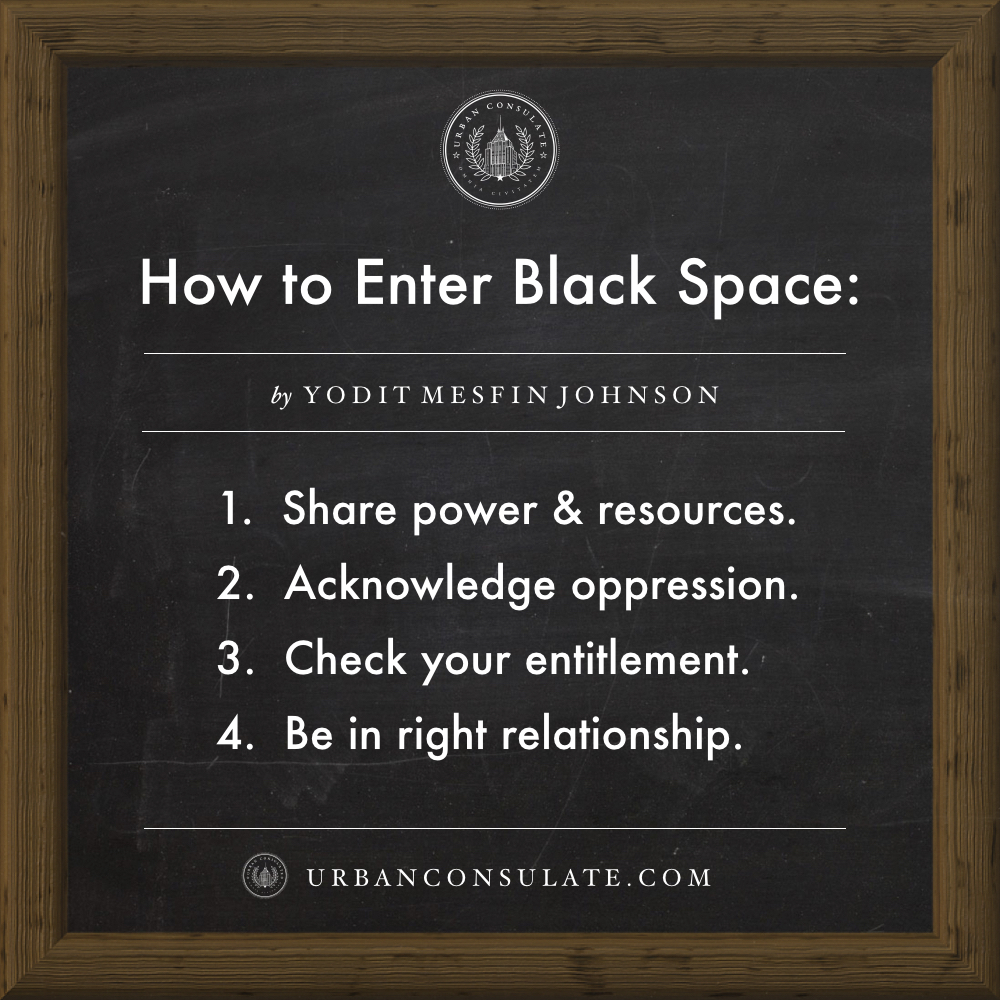"How can white people assimilate into Black communities with respect & honor?"
This was the question posed by Detroit champion Yodit Mesfin Johnson at her parlor talk at the Urban Consulate in Detroit on December 6, 2017.
A daughter of Detroit and respected community leader, Mesfin Johnson is a passionate advocate for equity and access for people of color.
But stepping back for a second, in case you're unfamiliar with the city:
Detroit is a majority Black city. Not just by a hair, by a wide margin—82%. And not just for a minute, for nearly a half century.
If you're new & white in Detroit, one of the first things you will learn—if you listen—is that you need to start right here: Understanding the city's demographics & history. How did Detroit come to be a Black city?
Read about Jim Crow laws and the Great Migration. Read about decades of white flight & investment. Read about redlining and housing segregation in the city & suburbs. Also read the current news, including the very real economic data—dollars & cents—of racial inequity, both locally & nationally.
Why does this matter? Because if you are entering a new community—any community, really—it is your responsibility to know the story of the place.
Many newcomers understand this; still many are learning. If you are a white American, it's quite possible you have never experienced being a minority before. This may be a new experience for you? That's okay. Welcome.
So this is where we begin.
The question for Mesfin Johnson's talk, she said, was inspired by Ms. Davis, a longtime resident of Detroit's North End.
The North End neighborhood is now seeing a new wave of interest due to its proximity to the greater downtown area—locally known as the 7.2—which has received the lionshare of new Detroit investment & development in recent years.
In her conversation with Ms. Davis, Mesfin Johnson heard something that moved her:
"Baby, we've always welcomed folk in our neighborhoods. It's not THAT they're coming, but HOW they're coming."
"In her statement I heard something different," said Mesfin Johnson. "Not analysis, research or academic views of gentrification. I heard a different perspective on the prevailing 'us and them' discourse and I latched on. I heard wisdom and history and courage and power. Resilience and love. A challenge to our generation to grab hold and do better. To challenge change and call it what it is. Not big systems change, but everyday just do a little effing better change."
So Mesfin Johnson posed this question on Facebook, which turned into a parlor talk. The response was overwhelming, with nearly 600 responses for a space that can hold 60.
"How can we resist oppression while simultaneously extending grace?"
Extending grace is exactly what Mesfin Johnson did, generously sharing her time & perspective on her changing hometown, weaving in anecdotes from elders, statistics from recent studies, input from the audience, and some recommendations for newcomers, too.
"About gentrification," she said, "the things we are doing to solve for it—the kinds of things we talk about at Mackinac—those are TACTICS. I want to talk about root causes."
"What does respect mean to you?"
To start the conversation, Mesfin Johnson invited the room to turn to their neighbors to answer this question. After huddling for a few minutes, guests shared out:
- "Listening before talking."
- "Looking people in the eyes and saying hello."
- "Appreciating difference, even when you don’t agree."
- "Reciprocity."
Seem simple? They are. As has been noted in past Consulate talks, these are basic, universal ideas that we all seem to learn when we are young, but sometimes forget when it comes to "adult" matters of urban revitalization and community change.
"I worry we use community engagement as an insurance policy, not as a central tenet of design."
Alongside happy memories of popular Black places & spaces past, Mesfin Johnson also shared concerns—including this one that has been echoed in many Consulate talks.
No doubt, we have seen the design & planning community awake to the need for greater stakeholder engagement & participation to make places successful. But are their projects really driven by the communities they serve?
As R. Steven Lewis, Kimberly Dowdell, Lauren Hood, Tya Winn & other Consulate guests have asked in both Detroit & Philadelphia: "Who is it built by? Who is it built for?"
These are questions worth asking—not just once, but ongoing, for any & every new community project.
"So what's the right way to enter black space?"
Mesfin Johnson made clear she does not speak for everyone, but shared four thoughts:
- You have to be willing to share power & resources—recognizing that systemic racism and privilege have robbed people of color and our communities of both.
- You have to acknowledge oppression—and not just name it, but act upon dismantling it. The realities of oppression and exclusion are real and inherent in the DNA of our society, as well as what's happening today in urban neighborhoods throughout America, not just Detroit.
- You have to check your entitlement—recognizing the deep impact that being systematically locked out of power tables, opportunity, resource, investment, housing and jobs has had on people of color. Pause before acting out of your power to deeply consider and understand the lived experience of people in the communities you are entering. "To whom much is given, much is required."
- You have to be intentional about being in relationship with one another—not just 8-5 at work, but in life. Where do you spend your money, your time? Who is in your vendor pool, your hiring? If everyone at the table (decision-making, design or otherwise) looks like you, you're missing key and important stakeholders. Transform your "Trusted 10." This is head, heart and hand work—so if you want to make a difference, it begins not with doing, but being in right relationship with your neighbors.
Mesfin Johnson concluded the evening by opening the floor to questions & answers—including an exchange about the call for "inclusion" and why it's not as simple as it may seem. (Again, who's including whom?)
- To watch the live video feed, click here.
- To read a recap in Model D, click here.
- For more pre & post-event dialogue, check the Facebook event page here.
ADDITIONAL READING
- Just Say Hi: The Gentrification Blues (Marsha Music, 2015)
- Detroit Needs to Preserve Black Space (Lauren Hood, Model D, 2017)
- Making Room for Race in Philly Public Space (PlanPhilly, Dec 2017)
- Change & The City (Urban Consulate, 2016)



